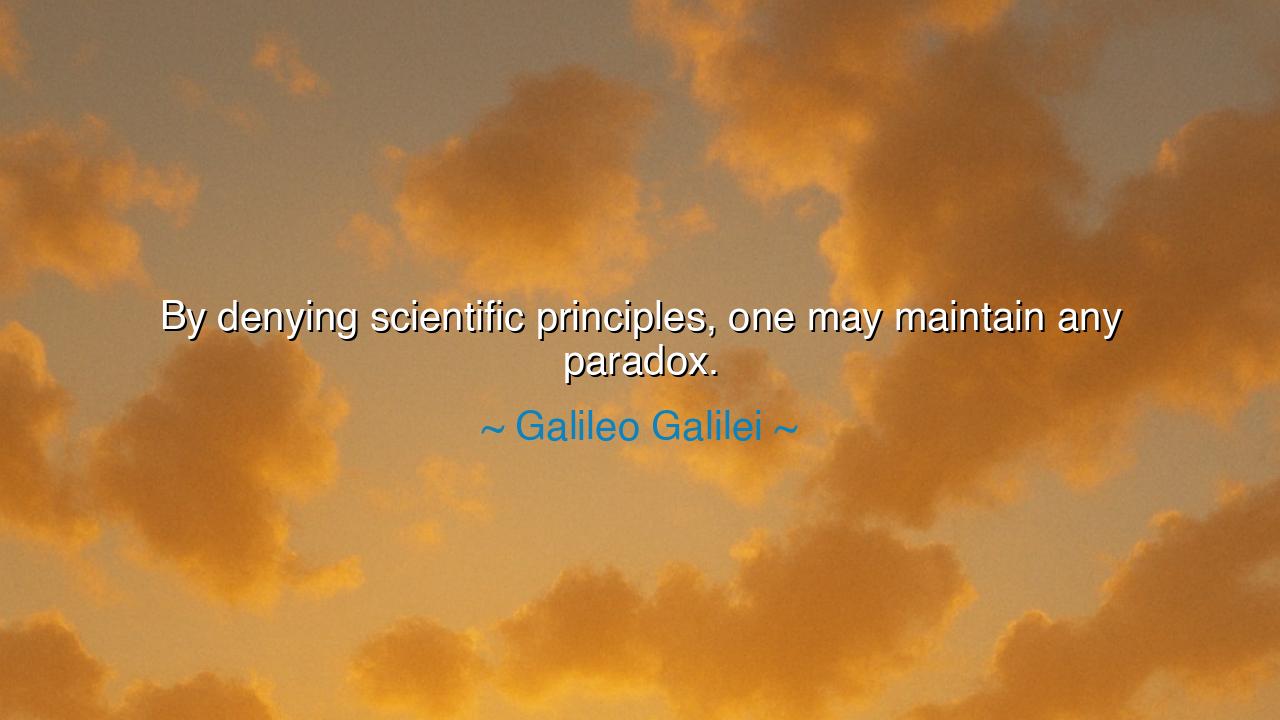
By denying scientific principles, one may maintain any paradox.






“By denying scientific principles, one may maintain any paradox.” Thus spoke Galileo Galilei, the titan of reason, who dared to lift his gaze to the heavens and declare what he saw with his own eyes, even when the world stood against him. In this brief yet thunderous truth, he warns us of the peril that comes when men abandon the firm ground of scientific principles. For without them, one can believe anything, justify anything, cling to contradictions, and preserve lies dressed as truth. To deny the discipline of evidence is to surrender to the chaos of paradox, where illusion masquerades as wisdom.
The origin of these words lies in Galileo’s own struggle with the entrenched powers of his time. He turned his telescope upon the heavens and saw the moons of Jupiter circling their master, a vision that shattered the old belief that all bodies revolved around the Earth. He observed the phases of Venus, the mountains of the Moon, the spots on the Sun—witnesses that the cosmos was not the perfect, unchanging sphere men had believed. Yet his enemies, fearing the collapse of doctrine, chose to deny scientific principles. They clung to paradox: teaching that Earth was the center even as evidence screamed otherwise. Galileo, with sorrow and fire, saw how denial could uphold falsehood against truth.
History is rich with such examples. Consider the age of medicine before the germ theory of disease. Men believed in miasmas and humors, theories riddled with contradictions. Some believed that bleeding a patient could restore health, though it often hastened death. Without the anchor of science, they maintained paradoxes, treating illness with the very means that worsened it. It was only when Pasteur, Koch, and others insisted on scientific principles—observation, testing, and proof—that medicine was freed from its shackles. Galileo’s words echo here: denial of science preserves paradox, but obedience to science resolves it.
There is also a darker tale: the rise of pseudoscience in service of power. In the twentieth century, some regimes denied biological truths to uphold racial theories. They cloaked their lies in the language of science but rejected its principles. By doing so, they maintained contradictions—that some men were inferior, that cruelty was justified by false biology. This denial had grave consequences, leading to genocide and war. Here, Galileo’s warning shines with tragic clarity: to deny scientific truth is not only to dwell in paradox but to invite suffering upon the world.
Yet Galileo’s saying is not only a rebuke; it is also a call to courage. For it is easier to cling to paradox than to face truth. To follow science requires humility—to admit error, to let go of cherished beliefs, to walk in uncertainty until clarity comes. But this is the path of growth. Galileo himself risked his freedom, even his life, to walk it. His courage shows us that to honor truth above paradox is the way of progress, the way of light.
The ancients knew something of this as well. Heraclitus declared, “Nature loves to hide,” meaning that truth is veiled, not obvious, and must be sought with care. Socrates insisted that the unexamined life is not worth living, for to live without testing beliefs is to live in self-deception. Galileo’s voice joins theirs, affirming that without scientific principles, man drifts in illusions; but with them, he can pierce the veil and stand in the light of truth.
So, O listener, take this lesson: never deny the principles of science, for they are the safeguard against folly and paradox. When faced with claims, test them; when confronted with belief, examine it; when tempted by comfort, choose truth instead. Do not dwell in contradiction for the sake of pride, nor cling to falsehood for the sake of ease. For though paradox may comfort for a moment, it destroys in the end. Truth, though hard, endures forever. Walk, therefore, as Galileo walked—fearless before paradox, steadfast in the pursuit of reality.






AAdministratorAdministrator
Welcome, honored guests. Please leave a comment, we will respond soon